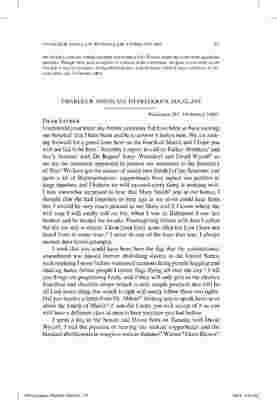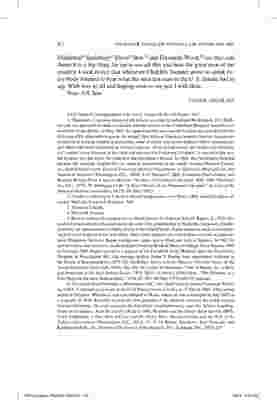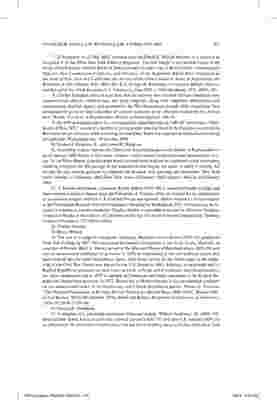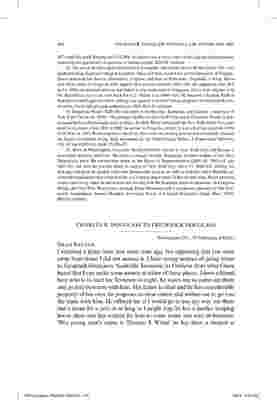Pages
1
CHARLES R. DOUGLASS TO FREDERICK DOUGLASS
Washington, D.C. 9 Feb[ruary] [18]65.
DEAR FATHER
I rec[eive]d your letter day before yesterday but have been so busy moving our hospital1Thousands of runaway slaves sought refugee [sic] in camps in and around Washington, D.C. Medical care was provided for them at a facility initially known as the Contraband Hospital, located in the northwest of the district. In May 1863, the approximately one-year-old hospital was placed under the direction of Dr. Alexander Augusta, the nation’s first African American hospital director. Augusta recruited more African American physicians, some of whom were given military officer commissions and others who were contracted as civilian surgeons. After several moves, the facility was relocated to Campbell Army Hospital in late 1864 and renamed the Freedmen’s Hospital. At the end of the war, the hospital was put under the control of the Freedmen’s Bureau. In 1868, the Freedmen’s Hospital became the teaching hospital for the medical department of the newly founded Howard University. Daniel Smith Lamb, Howard University Medical Department: A Historical, Biographical, and Statistical Souvenir (Washington, D.C., 1900), 8-9; Thomas C. Holt, Cassandra Smith Parker, and Rosalyn Terborg-Penn, A Special Mission: The Story of Freedmen’s Hospital, 1862—1962 (Washington, D.C., 1975); W. Montague Cobb, “A Short History of the Freedmen’s Hospital,” Journal of the National Medical Association, 54:271—87 (May 1962). that I have been unable to answer it before now. We are looking forward for a grand time here on the fourth of March and I hope you will not fail to be here.2Charles is referring to Lincoln’s second inauguration, on 4 March 1865, which his father attended. McFeely, Frederick Douglass, 240. Saturday I expect to call on Father Abraham3Abraham Lincoln. and Sec’y Stanton4Edwin M. Stanton. with Dr. Rapier5Born to moderately prosperous free black parents in Alabama, John H. Rapier, Jr. (1835-65), received a rudimentary education under the care of his grandmother in Nashville, Tennessee. Disillusioned by the opportunities available to him in the United States, Rapier joined an uncle in immigrating to Central America in the mid-1850s. After a brief return to the United States to work as a journalist in Minnesota Territory, Rapier immigrated again, first to Haiti and then to Jamaica. In 1862, he moved to Iowa and received a medical degree from the Keokuk Medical College. From January 1864 to February 1865, Rapier served as a surgeon at the Campbell Army Hospital, later the Freedmen’s Hospital, in Washington, D.C. His younger brother, James T. Rapier, later represented Alabama in the House of Representatives (1873-75). Ira Berlin, Slaves without Masters: The Free Negro in the Antebellum South (New York, 1974), 280, 356, 387; Loren Schweninger, “John H. Rapier, Sr.: A Slave and Freedman in the Ante-Bellum South,["] CWH, 20:23-34 (March 1974); idem., “The Dilemma of a Free Negro in the Ante-Bellum South,” JNA, 62: 283-88 (July 1977); BDUSC (online). Sergt. Wormley6The son of James Wormley, a Washington, D.C., free black hotelier, James Thompson Wormley (1844—?) enlisted as a private in the Fifth Massachusetts Cavalry on 17 March 1864. After seeing action in Virginia, Wormley’s unit was shipped to Texas, where he was discharged in July 1865 as a sergeant. In 1870, Wormley became the first graduate of the medical school at the newly created Howard University. He soon operated the first black-owned pharmacy, near his father’s boardinghouse in the district. After his father’s death in 1884, Wormley ran his father’s hotel into the 1890s. Carol Gelderman, A Free Man of Color and His Hotel: Race, Reconstruction, and the Role of the Federal Government (Washington, D.C., 2012), 12, 17-19; Robert Benedetto, Jane Donovan, and Kathleen DuVall, eds., Historical Dictionary of Washington, D.C. (Lanham, Md., 2003), 247. and David Wycoff7In Rochester on 22 July 1862, nineteen-year-old David E. Wycoff enlisted as a corporal in Company F of the 108th New York Infantry Regiment. The unit fought in the Second Corps of the Army of the Potomac from the Battle of Antietam until the war’s end. A Record of the Commissioned Officers, Non-Commissioned Officers, and Privates, of the Regiments Which Were Organized in the State of New York and Called into the Service of the United States to Assist in Suppressing the Rebellion, 8 vols. (Albany, N.Y., 1865-68), 4:72; George H. Washburn, A Complete Military History and Record of the 108th Regiment N.Y. Volunteers, from 1862 to 1894 (Rochester, N.Y., 1894), 469. as we are the committe appointed to present our memorial to the Secretary of War.8Charles Douglass refers to a petition that he and over two hundred African American non-commissioned officers, enlisted men, and army surgeons, along with supportive abolitionists and congressmen, drafted, signed, and presented to the War Department in early 1865, requesting “that permission be given to raise a number of colored regiments to be officered exclusively by colored men.” Berlin, Freedom: A Documentary History of Emancipation, 340-41. We have got the names of nearly two third[s] of the Senators; and quite a lot of Representatives, copperheads have signed our petition in large numbers and I believe we will succeed every thing is working well. I was somewhat surprised to hear that Mary Smith9An 1889 newspaper report by a correspondent identified only as “ARAB” described a “Mary Smith of Troy, N.Y.,” as one of a number of young people who had lived in the Douglass household in Rochester for several years while receiving an education. Smith was reported as married and residing in California. Washington Bee, 19 October 1889. was at our house, I thought that she had forgotten us long ago as we never could hear from her. I should be very much pleased to see Mary and if I know where she will stop I will surely call on her, when I was in Baltimore I saw her brother and he invited me to take Thanksgiving dinner with him I called but did not stay to dinner. I hear from Fred. quite often but Lew I have not heard from in some time.10Frederick Douglass, Jr., and Lewis H. Douglass. I never do any of the boys that way. I always answer their letters promptly.
I wish that you could have been here the day that the constitutional amendment was passed forever abolishing slavery in the United States, such rejoicing I never before witnessed cannons firing people hugging and shaking hands (white people I mean) flags flying all over the city.11According to press reports, the Thirteenth Amendment passed the House of Representatives on 31 January 1865 before a very large audience, which reacted with cheers and handkerchief waving. At the White House, Lincoln spoke from a second-story window to a gathered crowd of revelers, thanking Congress for the passage of the amendment and urging the states to ratify it swiftly. All around the city, crowds gathered to celebrate the decision with speeches and serenades. New York Daily Tribune, 1-3 February 1865; New York Times, 1 February 1865; Harper’s Weekly, 18 February 1865. I tell you things are progressing finely, and if they will only give us the elective franchize and shoulder straps (which is only simple practice) that will be all I ask every thing else which is right will surely follow these two rights. Did you receive a letter from Dr. Abbott12A Toronto-born black, Anderson Ruffin Abbott (1837-1913) attended Oberlin College and then received a medical degree from the University of Toronto. After his request for an appointment as an assistant surgeon with the U.S. Colored Troops was ignored, Abbott became a civilian surgeon at the Contraband Hospital (later the Freedmen’s Hospital) in Washington, D.C. After the war, he returned to Ontario to practice medicine. Charles alludes to a possible invitation by Abbott to Douglass to speak to blacks in the District of Columbia on the day of Lincoln’s second inauguration. Quarles, Frederick Douglass, 233; DCB (online). inviting you to speak here on or about the fourth of March? if you did I hope you will accept of it as you will have a different class of men to hear you than you had before.
I spent a day in the Senate and House both on Tuesday with David Wycoff, I had the pleasure of hearing the rankest copperheads and the blackest abolitionists in congress such as Sumner13Charles Sumner. Wilson14 Henry Wilson. Gratz Brown15The son of a judge in Lexington, Kentucky, Benjamin Gratz Brown (1826-85) graduated from Yale College in 1847. Two years later he entered the practice of law in St. Louis, Missouri, as a partner of Francis Blair, Jr. Brown served in the Missouri House of Representatives (1852-58) and was an unsuccessful candidate for governor in 1857; he represented a free-soil political faction that later evolved into the state’s Republican party. After brief service in the Union army at the beginning of the Civil War, Brown was elected to the U.S. Senate in 1863. Although he originally held to Radical Republican positions on such issues as black suffrage and Confederate disenfranchisement, his views moderated, and in 1870 a coalition of Democrats and other opponents of the Radical Republicans elected him governor. In 1872, Brown ran as Horace Greeley’s vice presidential candidate on the unsuccessful ticket of the Democratic and Liberal Republican parties. Norma L. Peterson, “The Political Fluctuations of B. Gratz Brown: Politics in a Border State, 1850-1870,” Missouri Historical Review, 50:22-30 (October 1956); Sobel and Raimo, Biographical Directory of Governors, 2:850-51; DAB, 3:105-06.
2
Pendleton16George H. Pendleton. Saulsbury17A member of a politically prominent Delaware family, Willard Saulsbury, Sr. (1820-92), practiced law before being elected state attorney general (1850-55) and then U.S. senator (1859-71) as a Democrat. He returned to the practice of the law before holding the post of state chancellor from 1873 until his death. During the Civil War, Saulsbury was a vocal critic of the Lincoln administration, especially the president’s suspension of habeas corpus. BDUSC (online). Davis18The son of an Episcopal minister from Annapolis, Maryland, Henry Winter Davis (1817-65) graduated from Kenyon College in Gambier, Ohio, and then studied law at the University of Virginia. Davis practiced law first in Alexandria, Virginia, and then in Baltimore. Originally a Whig, Davis won three terms in Congress with support of a nativist coalition (1855-61). He supported John Bell in the 1860 presidential election but failed to win reelection to Congress. Davis then aligned with the Republican party and won back his U.S. House seat (1863-65). He became a leading Radical Republican and fought for black suffrage and against Lincoln’s lenient program for Southern Reconstruction. Davis did not seek reelection in 1864. BDUSC (online). Ben.19Benjamin Wood (1820-90) was born in Shelbyville, Kentucky, and became a merchant in New York City in the 1850s. The younger brother of New York City mayor Fernando Wood, he participated in local Democratic party politics. In 1860 Wood purchased the New York Daily News and acted as its editor. From 1861 to 1865, he served in Congress, where he was a leading opponent of the Civil War. In 1867, Wood converted the Daily News into an evening journal that eventually attained the largest circulation of any daily newspaper in the United States. Silbey, A Respectable Minority, 133; ACAB, 6:592-93; DAB, 20:456-57. and Fernandy Wood.20Born in Philadelphia, Fernando Wood (1812-81) moved to New York City and became a successful shipping merchant. He and his younger brother, Benjamin, became leaders of the city’s Democratic party. He served nine terms in the House of Representatives (1841-43, 1863-65, and 1867-81), but won his greatest fame as mayor of New York City (1855-57, 1860-62). During his first mayoral term, he feuded with other Democratic factions as well as with the state’s Republican-controlled legislature over control of the city’s police department. In his second term, Wood attracted much controversy when he advocated that the city join the Southern states in secession. In Congress during the Civil War, Wood was a leading Peace Democrat and a vociferous opponent of the Thirteenth Amendment. Jerome Mushkat, Fernando Wood: A Political Biography (Kent, Ohio, 1990); BDUSC (online). (as they call them) It is a big thing for me to see all this and hear the great men of the country. I took notice that whenever Cha[rle]s Sumner arose to speak every body listened to hear what the smartest man in the U. S. Senate had to say. With love to all and hoping soon to see you I will close.
Your Aff. Son
CHAS R. DOUGLASS
ALS: General Correspondence File, reel 2, frames 88-89, FD Papers, DLC.



